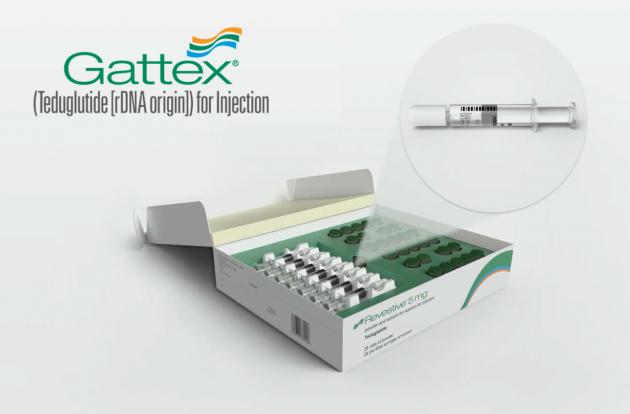Rare disease specialty biopharmaceutical firm Shire Korea said Wednesday it got the Ministry of Food and Drug Safety’s approval for its short bowel syndrome treatment Gattex (teduglutide) Friday.

Gattex is the first treatment that won approval for short bowel syndrome in Korea. People over one year of age who have been relying on existing total parenteral nutrition (TNP) can now use the therapy.
The European Medicines Agency first approved Gattex in August 2012 as Revestive, and the U.S. Food and Drug Administration approved the therapy in December the same year.
“Gattex is a treatment that can significantly improve the quality of life of patients compared to conventional parenteral nutrition with once-a-day injections,” Shire Korea CEO Moon Hee-seok said.
Short bowel syndrome (SBS) is a malabsorption disorder caused by a dysfunctional small intestine. Most cases are caused by surgically removing a large part of the small intestine. Infants are either born with the condition or develop it due to surgery for necrotizing enterocolitis. Adults can develop the syndrome either through intestinal resection due to mesenteric vascular disease or Crohn's disease.
The most common symptoms are diarrhea, malnutrition, dehydration, foul-smelling stool, and weight loss. Its severe cases can also lead to death.
Due to the lack of treatment options, short bowel syndrome patients relied on total parenteral nutrition (TPN) therapy to facilitate nutritional supply. TPN is a method of supplying nutrients to patients who cannot take food orally through intravenous injection. It takes about five to seven days a week and 10 hours a day. In addition to strenuous administration durations, continuing long-term TPN therapy can also cause bacteremia, sepsis, and thrombosis due to the infections possibly caused by inserting equipment. Liver disease is also common.
Gattex is a once-daily subcutaneous injection administered to the patient via the thigh, arm or abdomen. The therapy is the first and only medicine that mimics naturally occurring GLP-2, and thereby possibly helps the intestine absorb more fluids.
Gattex can cause serious side effects such as making abnormal cells grow faster, polyps in the colon, blockage of the bowel, swelling or obstruction of the gallbladder or pancreas, and fluid overload.
The ministry based its approval on a phase 3 STEPS trial. It was the multicenter, randomized, parallel, placebo-controlled, double-blind study on 86 patients who had continually received parenteral nutrition for over 12 months for 24 weeks. Experimenters divided the patients into two 43-person groups with the Gattex arm taking 0.05mg/kg of the therapy and the other group receiving a placebo.
Results showed that 27 people in the Gattex arm saw a 20 percent reduction of their PN administration with the one-week PN administration dose reduced to 4.4L per week from the standard value of 12.4L per week at 24 weeks.
Also, 49 percent in the Gattex group saw improvements to the point where they did not need PN therapy for more than one day out of the week.
Because there are no therapies for the drug aside from TPN therapy, Gattex serves as not maintenance therapy but as a long-term therapy, Shire said.
“Shire Korea is a global biotechnology company that has been leading the development of rare disease treatments, Moon said. “With the approval of the Gattex, we will try to expand the treatment options for patients with short bowel syndrome and improve the quality of life of patients.”

